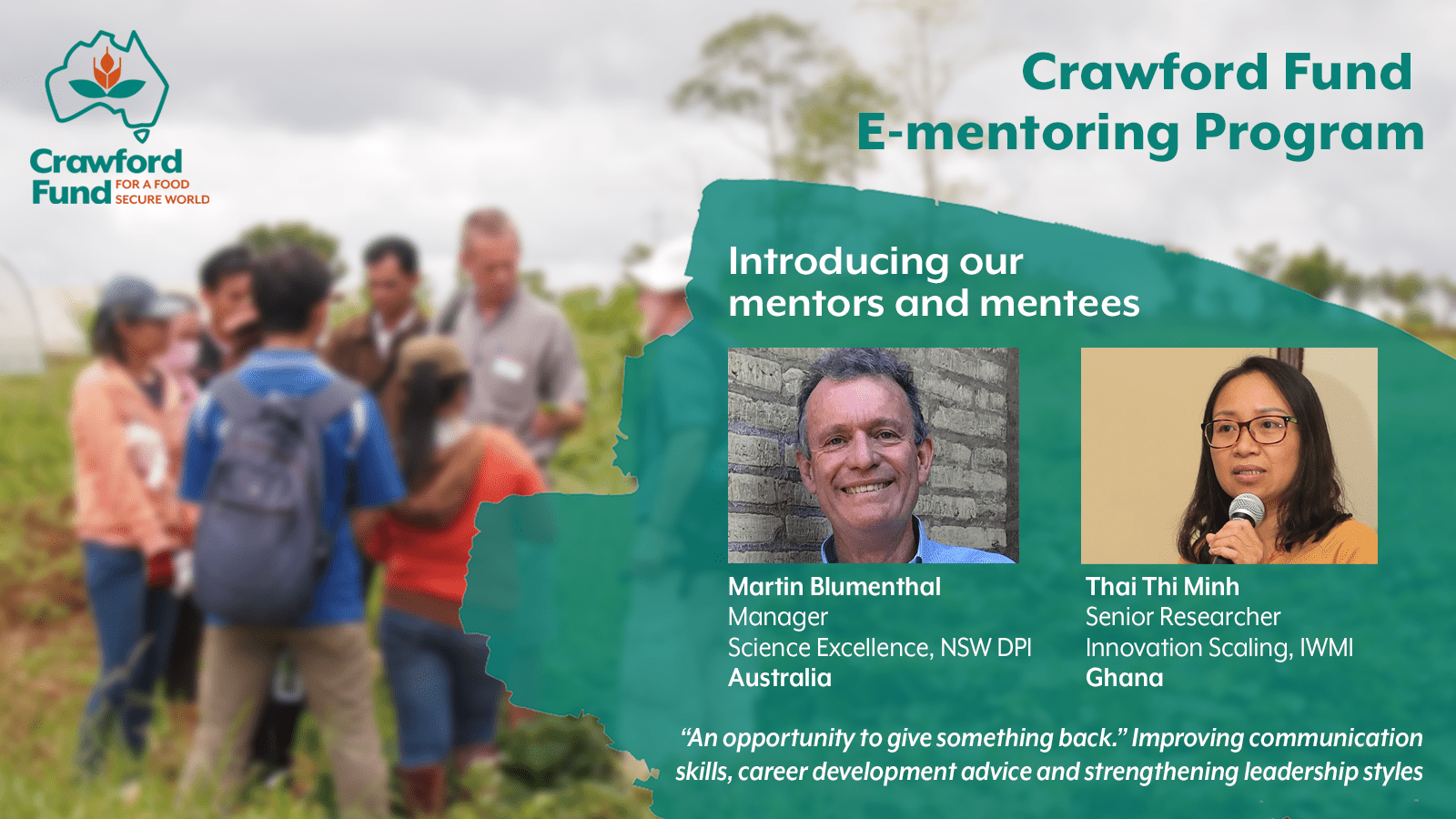

“An opportunity to give something back.” Improving communication skills, career development advice and strengthening leadership styles the focus of this mentoring pair
April 6, 2021

Late last year we announced our first group of e-mentors and e-mentees as part of our new E-mentoring Program. This program was launched to ensure that, despite COVID-19 and its travel and life restrictions, we could continue to help develop the technical and organisational skills and expertise of agricultural researchers, scientists and policy makers in developing countries.
This program builds on the success of our long term existing Mentoring Program, which has seen face-to-face interaction in overseas countries, backed up by electronic contact, and our conference scholar mentoring program, matching young NextGen researchers with experienced Australians who attend our conference.
We hope that these e-connections not only deliver positive and targeted skill-sharing outcomes, but also enduring connections between the Crawford Fund, the volunteering mentors and their mentees, and the institutions and countries involved.
Over the coming months, we will be sharing reflections, in a Q and A style, from our e-mentors and e-mentees and today we present Martin Blumenthal, Manager Science Excellence in the NSW Department of Primary Industries and his e-mentee Thai Thi Minh, a Senior Researcher at the International Water Management Institute based in Ghana.
E-MENTOR/E-MENTEE PAIRING
Martin Blumenthal (Australia) and Thai Thi Minh (Ghana)
MENTOR
Martin Blumenthal – Manager Science Excellence
NSW Department of Primary Industries
What motivated you to be a mentor?
I have gained a lot personally from a diverse career in agricultural research and research management. Being a mentor is an opportunity to give something back to the profession especially in international development.
What are the main goals you are focusing on from your agreed mentoring plan?
The three main goals are:
- Recognise and adapt relevant leadership and management styles to different situations.
- Increased skill in communicating with different audiences.
- Clarify clear goals for future career development.
What are the various ways you are communicating and what combination are you finding most useful?
We are using skype and email to communicate. With an 11-hour time difference there are only a few times that work well for skype calls! Initially we touched based fortnightly, now that the goals are set, we can meet less frequently.
What are you getting out of our e-mentoring program?
As a mentor I’m learning a lot about listening and phrasing questions in a “guiding” not “directing” way. I’m also learning a lot about how R&D functions in Ghana and West Africa and the drivers of on-farm adoption in that region
Any lessons you could share with the other e-mentors?
Listen before speaking, be available and encourage the mentee to think through a possible range of solutions to a problem or opportunity.
Anything more to add?
A really effective activity to be doing during COVID-19 restrictions.
MENTEE
Thai Thi Minh – Senior Researcher
Innovation Scaling, International Water Management Institute, Ghana
What motivated you to nominate to be a mentee?
Leadership and communication in research for development community, especially in the CGIAR system are challenges for me for growth in my career and in the system.
What are the main goals you are focusing on from your agreed mentoring plan?
The main goals I am focused on in my mentoring plan are:
- Recognise and adapt the leadership and management style that suits to the research for development environment
- Increase self-confidence in communication with different target audiences
- Being able to discuss and gain greater clarity about career and development issues, in an open and off-line environment
- Identify clear research impact in specific project and in research career
How is the e-mentoring helping your development?
- Think out of the box about preparation to gain pre-confidence in communication
- Strengthening effective communication skills to tailor the communication to different audiences
- A clear visualization of the career development prospect
- Strengthening the leadership with customizing 4H management style (hand-in; hand-on; hand-off and hand-up) to different colleagues
Any lessons you could share with the other e-mentees?
Be open and expressive to your mentor about your challenges, weaknesses as well as strengths and interests.




